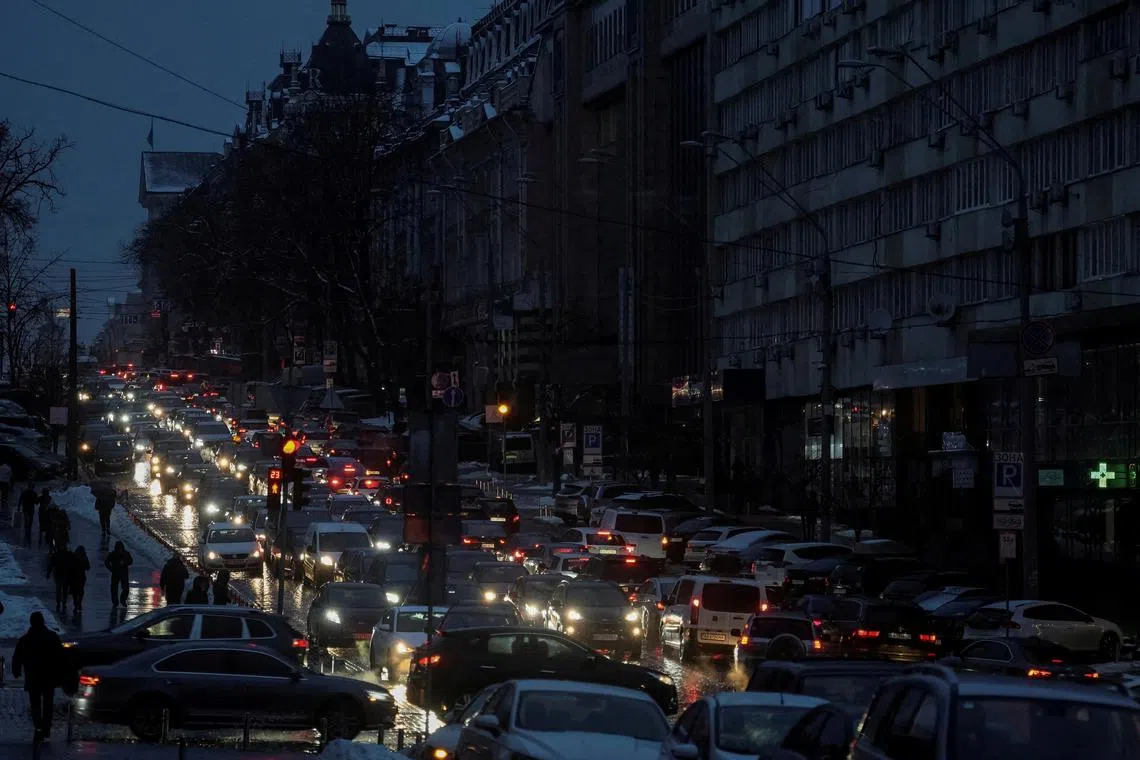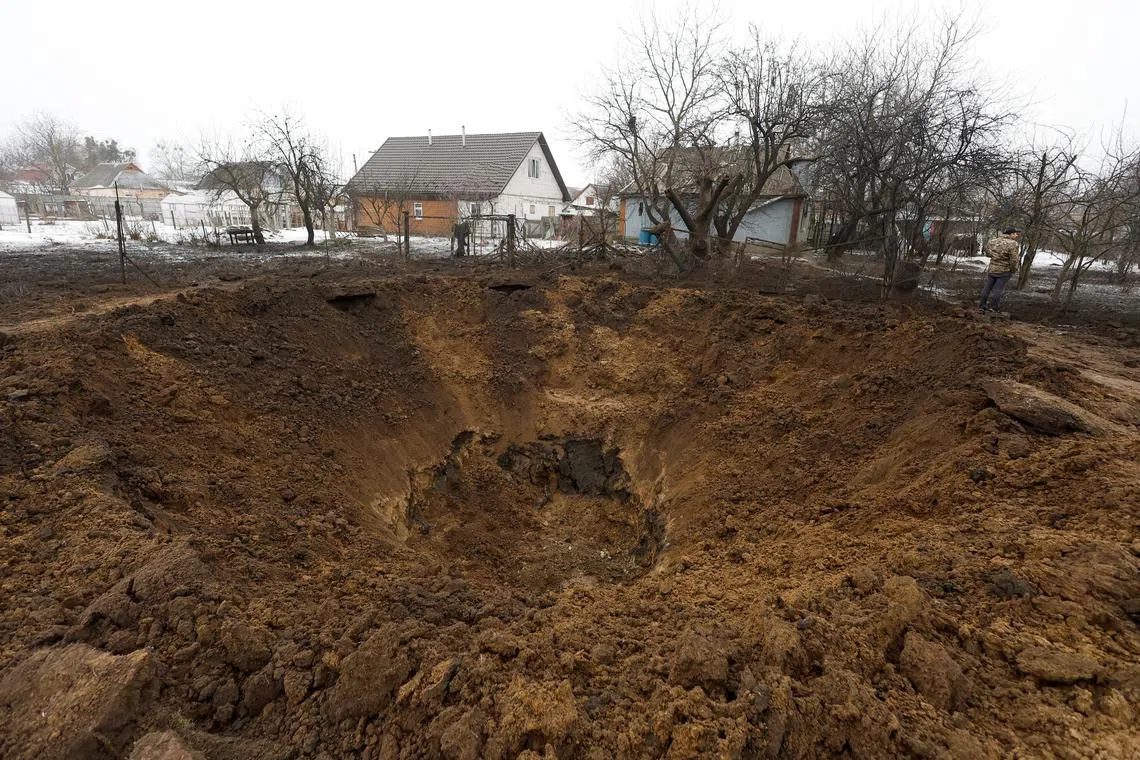Russia hits Ukraine with fresh missile strikes, damaging vital infrastructure in Kyiv, Kharkiv
Sign up now: Get ST's newsletters delivered to your inbox

Russia has been targeting Ukraine’s energy infrastructure, causing blackouts and disruptions to heating and running water.
PHOTO: REUTERS
KYIV - Ukraine was hit by two waves of Russian air strikes on Saturday, with air raid sirens sounding across much of the country and and emergency power cuts announced across multiple regions.
The morning’s missile strikes hit crucial infrastructure targets in Ukraine’s capital Kyiv and the eastern city of Kharkhiv, while damage from the afternoon’s assaults were still being confirmed.
Authorities in Mykolaiv in the south, the western city of Lviv and the Black Sea port of Odesa said air defences were trying to shoot down incoming missiles.
Explosions were heard in the central Vynnytsa region. Artillery shelling was also reported in and around Nikopol, southwest of Zaporizhzhia.
A strike on a residential building in the eastern Ukrainian city of Dnipro left at least five dead and 27 injured, officials said.
“There are already five dead,” Dnipropetrovsk governor Valentyn Reznichenko said on messaging app Telegram, where he posted a photo of an apartment block reduced to ruins, adding: “Twenty-seven people were wounded. Among them are six children. All are in hospital.”
In the morning, journalists in Kyiv heard a series of blasts before the air raid siren even sounded, which was highly unusual.
Ukraine’s Air Defence said Kremlin forces launched the missiles, likely ballistic and undetectable by air defence, from the north.
Ukraine is not able to identify and shoot down ballistic missiles, Air Force spokesman Yuriy Ihnat said.
No one was reported hurt in the attacks on Kyiv in the morning, officials said, but missile debris caused a fire in one place and houses were damaged outside the capital.
“Explosions in the (eastern) Dniprovskiy district. All agencies heading to the site. Stay in your shelters!” Kyiv Mayor Vitali Klitschko wrote on Telegram.
Ahead of the second attack in the afternoon, the governor of the central Cherkasy region had warned that a massive Russian missile strike could come, while the governor of Mykolaiv said that 17 Russian Tupolev warplanes had taken off from their air bases.
Russia, which invaded Ukraine last February, has been pounding the country’s energy infrastructure
Mr Klitschko said the debris of a missile came down on a non-residential area in the Holosiivskiy district in the west of Kyiv, causing a fire but hurting no one.
“An infrastructure facility was hit. No critical damage or fire. All emergency services are working at the site. No one is wounded,” Kyiv’s military administration said.
Ukrenergo, which runs the power grid, said its workers were racing to fix the damage and that the network was grappling with a power deficit caused by earlier attacks even though it was -2 degrees Celsius in Kyiv, only mildly cold.
DTEK, the biggest private electricity company, introduced emergency blackouts in Kyiv, the Kyiv region and Odesa region. Other regions also came under power cuts.
Residential infrastructure was hit in the village of Kopyliv in the region just outside the capital. The windows and roofs of 18 privately owned houses were shattered or damaged by the blast, regional governor Oleksiy Kuleba said.

A crater left by a Russian missile in the village of Kopyliv on Saturday.
PHOTO: REUTERS
In Ukraine’s northeast, Kharkiv’s regional governor Oleg Synehubov said two S-300 missiles struck the city near the Russian border early on Saturday.
The attacks hit critical energy infrastructure and industrial facilities in the Kharkiv and Chuhuev district of the region.
“Our emergency services units and energy workers are working to liquidate the consequences and stabilise the situation with energy supplies,” Mr Synehubov said.
Saturday’s strikes came as Ukrainian and Russian forces battled for control of Soledar
Russia said on Friday that its forces had taken control of Soledar, in what would be a rare success for Moscow after months of battlefield reverses, but Kyiv said its troops were still fighting in the town
The situation in Soledar could not be immediately verified.
British Prime Minister Rishi Sunak indicated that his country would send Ukraine send some of its main battle tanks
Media reports have suggested Britain was in discussions with Ukraine to deliver the Challenger 2 tanks to help the country fight invading Russian forces.
Mr Sunak’s office has previously said Britain would co-ordinate its support with allies, after Germany, France and the United States all indicated last week they would provide armoured vehicles to Ukraine.
“The prime minister outlined the UK’s ambition to intensify our support to Ukraine, including through the provision of Challenger 2 tanks and additional artillery systems,” a spokesman for Mr Sunak said.
“They agreed on the need to seize on this moment with an acceleration of global military and diplomatic support to Ukraine.”
The spokesman added: “The Prime Minister and President Zelensky welcomed other international commitments in this vein, including Poland’s offer to provide a company of Leopard tanks.”
Mr Sunak’s office said further details would be provided shortly.
The Challenger 2 is a battle tank designed to attack other tanks, and has been in service with the British Army since 1994. It has been deployed in Bosnia and Herzegovina, Kosovo and Iraq, according to the army.
Mr Zelensky welcomed Britain’s decision, saying it would “send the right signal” as Kyiv has been pressing allies for more heavy weapons.
“I thanked (Mr Sunak) for the decisions that will not only strengthen us on the battlefield, but also send the right signal to other partners,” Mr Zelensky said.
Mr Andriy Yermak, Mr Zelensky’s head of staff, wrote on Twitter: “This is an important contribution to the defence of freedom and democracy in Europe. We are grateful to... the (British) people for their help.”
Separately, Mr Zelensky said he was optimistic about the resolve of Western partners to pledge more arms support at the next meeting of the Ukraine Defence Contact Group. Senior military officials will attend the Jan 20 gathering at Ramstein Air Base in Germany. BLOOMBERG, REUTERS


